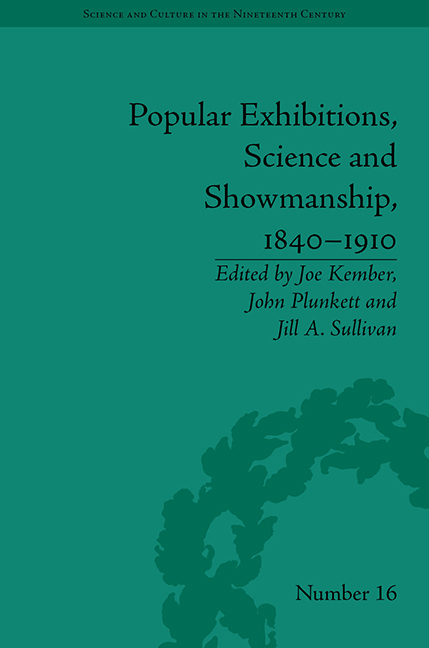Book contents
- Frontmatter
- CONTENTS
- Acknowledgements
- List of Contributors
- List of Figures and Tables
- Introduction
- Part I Science and Spectacle
- Part II Word and Image
- 4 Beyond Scientific Spectacle: Image and Word in Nineteenth-Century Popular Lecturing
- 5 Daniel William Cahill and the Rhetorical Geography of Science and Religion
- 6 Narrativizing ‘The World's Show’: The Great Exhibition, Panoramic Views and Print Supplements
- Part III Staging Knowledge
- Part IV The Politics of Display
- Notes
- Index
4 - Beyond Scientific Spectacle: Image and Word in Nineteenth-Century Popular Lecturing
from Part II - Word and Image
- Frontmatter
- CONTENTS
- Acknowledgements
- List of Contributors
- List of Figures and Tables
- Introduction
- Part I Science and Spectacle
- Part II Word and Image
- 4 Beyond Scientific Spectacle: Image and Word in Nineteenth-Century Popular Lecturing
- 5 Daniel William Cahill and the Rhetorical Geography of Science and Religion
- 6 Narrativizing ‘The World's Show’: The Great Exhibition, Panoramic Views and Print Supplements
- Part III Staging Knowledge
- Part IV The Politics of Display
- Notes
- Index
Summary
In 1858 John de Fraine, one of the not inconsiderable band of popular but subsequently obscure public lecturers of Victorian Britain, was announced to give his first professional lecture at the Sailors' Institute, Shadwell. It was, de Fraine later recalled, ‘a rather trying experience’.
I was announced to give a lecture, I forget on what subject, but I know that I was going to illustrate it with dissolving views, and that I had the fine lantern belonging to the Band of Hope Union. I went very early to the under-ground kitchen of the Institute to make the gas, but I got altogether confused. The retorts became red-hot, and it's a wonder there wasn't an explosion. I managed to get the retorts from the fire, but I was in a bath of perspiration, and greatly upset, for I knew there could be no exhibition of views, and I could hear the crowd of people assembling in the hall above. I was obliged to tell the Committee that nothing could be done; but they kindly suggested that I should give a lecture. I did so, and a large number remained to hear it notwithstanding the disappointment about the lantern views; and I was greatly encouraged and cheered by a gentleman coming to the edge of the platform, at the close of the meeting and saying: ‘never mind, young friend, about the views, there were plenty of pictures out of your own mouth, and as long as you can speak like that you can do without a lantern’.
- Type
- Chapter
- Information
- Popular Exhibitions, Science and Showmanship, 1840–1910 , pp. 79 - 96Publisher: Pickering & ChattoFirst published in: 2014



